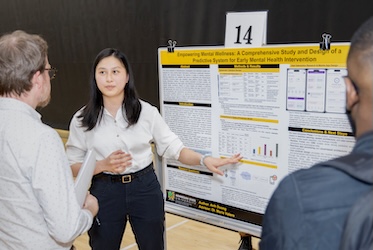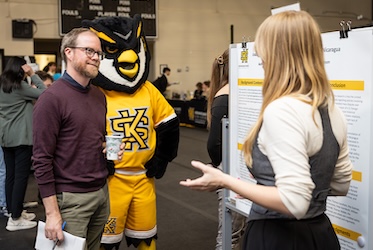
KSU Professor Wins Most Influential Paper Award at International Conference
KENNESAW, Ga. | Aug 10, 2020

A decade after co-authoring a research paper on self-adapting software systems, Kennesaw State University software engineering professor Paola Spoletini has been awarded the Most Influential Paper Award by the 2020 IEEE International Requirements Engineering (RE) Conference.
The paper, titled “Fuzzy Goals for Requirements-Driven Adaptation,” qualified for the honor for demonstrating the “single largest impact on the requirements engineering community over the past 10 years.” Originally submitted to the RE 2010 conference in Sydney, Australia, it has been cited more frequently than all other papers submitted that year. She co-wrote the paper with colleagues Liliana Pasquale and Luciano Baresi.
“If you would have asked me 10 years ago to predict the impact of this one paper, I would have never expected it to influence so many researchers,” she said. “Looking back on it, this was the launching point for my journey into requirements engineering, and I don’t believe I would be where I am today without that experience.”
Then an assistant professor at Italy’s University of Insubria, Spoletini said she was encouraged to help author the paper by Pasquale, officially launching her interest in requirements engineering. After months of research and testing of a new programming language, the trio wrote the paper over a period of 10 days in Spoletini’s apartment.
"I always find the most interesting results come when you work with people of different competencies than you, and this paper was the perfect example of that," she said. "We needed to work together and find a common language in order to produce results, and that’s how I approach pulling together my own research teams at KSU.”
Since arriving at Kennesaw State’s College of Computing and Software Engineering in January 2015, Spoletini has created the Tiresias Lab, designed to introduce software
engineering students more advanced applications of requirements engineering. Requirements
engineering is the practice of collecting, modeling, validating and understanding
the required features for a new or modified product and communicating the expectations,
and the contexts in which it will be used. The lab is named for the blind prophet
Tiresias of Greek mythology.
“The idea is that you may not be able to see your requirements, but you can find them through knowledge and the tools we produce in the lab through our research,” Spoletini said.
In 2017, Spoletini received more than $390,000 from the National Science Foundation to conduct research that could ultimately lead to the development of better system software. Her research relies on technologies, such as biofeedback and voice analysis, to help analysts during interviews with potential software users in identifying the increasing level of frustration in the customer, which, she states, might cause mistrust in the analyst during the trial phase of development.
– Travis Highfield
Related Stories

Kennesaw State to revive bathtub race tradition with new video game

Passions spark innovation at Kennesaw State Symposium of Student Scholars

Kennesaw State student develops AI tools to help first responders diagnose behavioral health issues

Kennesaw State students to present research at Symposium of Student Scholars
A leader in innovative teaching and learning, Kennesaw State University offers undergraduate, graduate, and doctoral degrees to its more than 47,000 students. Kennesaw State is a member of the University System of Georgia with 11 academic colleges. The university’s vibrant campus culture, diverse population, strong global ties, and entrepreneurial spirit draw students from throughout the country and the world. Kennesaw State is a Carnegie-designated doctoral research institution (R2), placing it among an elite group of only 8 percent of U.S. colleges and universities with an R1 or R2 status. For more information, visit kennesaw.edu.














